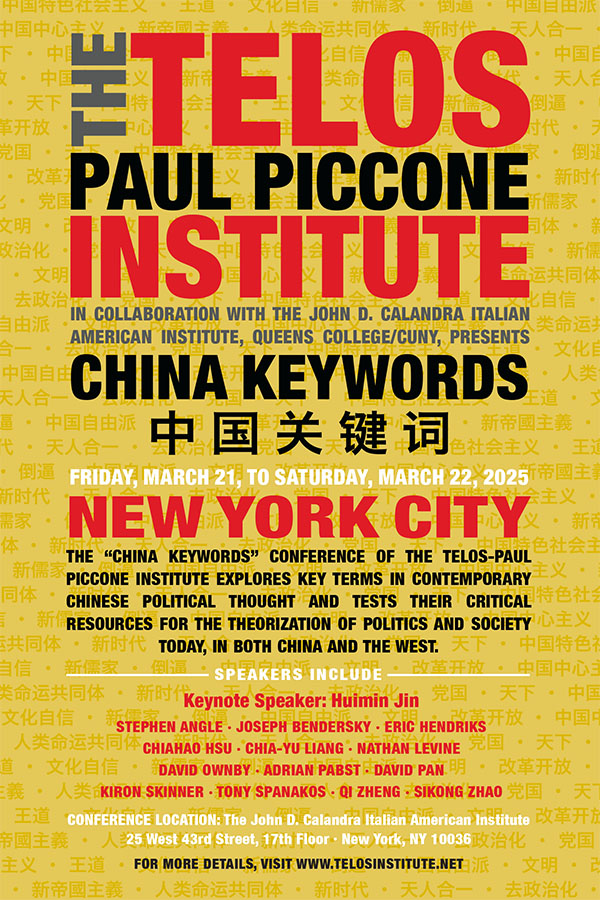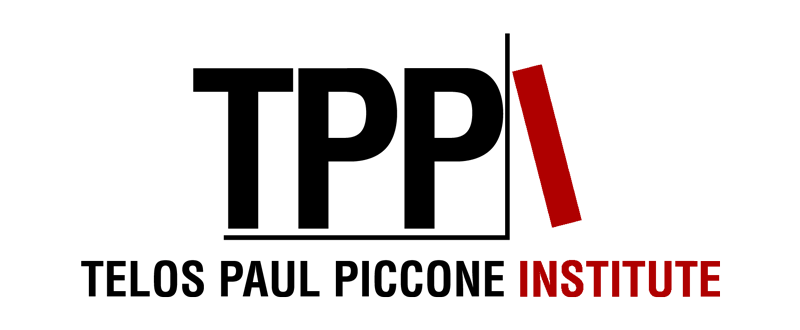The 2025 Telos-Paul Piccone Institute Annual Conference
March 21–22, 2025
The John D. Calandra Italian American Institute, Queens College/CUNY
25 West 43rd Street, 17th Floor
New York, NY 10036
China Keywords / 中国关键词
Co-sponsored by the John D. Calandra Italian American Institute, Queens College/CUNY
Keynote Address
Huimin Jin, Professor of Literary and Cultural Theory, School of Literature and Journalism, Sichuan University
“A Reconceptualization of ‘Cultural Subject’ and ‘Cultural Subjectivity’ in the Context of Present-Day China”
Conference Registration
Click here to register for the conference.
Conference Description
 The Telos circle falls outside many conventional intellectual categories. During the Cold War, this quality enabled us to form a bridge between the Anglosphere and eastern and central Europe. We fostered work by Soviet-bloc intellectuals, helping Western readers understand the ideological dynamics at play behind the Iron Curtain; we supported a wide variety of dissidents in their opposition to bureaucratic centralization, as we have likewise for opponents of bureaucratic governance in the West; and we brokered an encounter between Marxism and phenomenology that was vital for critical thinkers in the Soviet and the liberal democratic worlds.
The Telos circle falls outside many conventional intellectual categories. During the Cold War, this quality enabled us to form a bridge between the Anglosphere and eastern and central Europe. We fostered work by Soviet-bloc intellectuals, helping Western readers understand the ideological dynamics at play behind the Iron Curtain; we supported a wide variety of dissidents in their opposition to bureaucratic centralization, as we have likewise for opponents of bureaucratic governance in the West; and we brokered an encounter between Marxism and phenomenology that was vital for critical thinkers in the Soviet and the liberal democratic worlds.
We believe that the future of the TPPI now lies in a parallel reciprocal engagement with China, to which we have given steadily increasing focus for the past ten years in our annual conferences. These meetings have laid the basis for seven special issues of the journal Telos. With the Telos China Initiative, we seek to become a key bridge for a mutually regarding, critical discussion of social and political theory between China and the West, well beyond the circles of East Asia specialists.
In that spirit, the “China Keywords” conference explores key terms in contemporary Chinese political thought and tests their resources for the theorization of Chinese and Western politics and society. What critical potential do concepts like tianxia, wangdao, daobi, nei-wai, and tianren heyi carry—in both China and the West? What are their implicit assumptions? Where do they challenge ideological dogmas? Where do they ground them? How do they challenge or disrupt bureaucratized power? Likewise, how do Chinese and Western political traditions speak to each other? How do Chinese thinkers interpret both Western liberalism and thinkers critical of liberalism such as Leo Strauss and Carl Schmitt? How can an intellectual encounter between Chinese and Western thought help advance democratic political development?
Our twenty-five speakers include Huimin Jin of Sichuan University, who will be delivering a keynote address about the concepts of “cultural subjectivity” and the “cultural subject” in contemporary China. Other speakers include Stephen Angle of Wesleyan University; Joseph Bendersky of Virginia Commonwealth University; David Ownby of the University of Montreal; Adrian Pabst of the University of Kent; Zhao Sikong of the Shanghai Academy of Social Sciences; Kiron Skinner, former Director of Policy Planning at the U.S. State Department; and Zheng Qi of East China University of Political Science and Law.
In the West, China figures significantly as an object and a projection screen, its interpretive subjectivity structurally obscured. From a strategic standpoint, as well as for the development of critically engaged theory in the service of democratic development, it is essential to examine China’s perspectives, stories, ideals, and intellectual traditions.
Keywords
Below are some of the keywords that will be discussed at the conference. They are crucial for critically understanding the political-theoretical dynamics of contemporary China.
- tianxia (天下)
- Socialism with Chinese characteristics (中国特色社会主义)
- wangdao (王道)
- cultural self-confidence (文化自信)
- New Confucianism (新儒家)
- daobi (倒逼)
- Chinese liberals (中国自由派)
- civilizations (文明)
- reform and opening-up (改革开放)
- sinocentrism (中国中心主义)
- neo-imperialism (新帝國主義)
- Community of Common Destiny (人类命运共同体)
- The New Era (新时代)
- heaven-human harmony (天人合一)
- depoliticization (去政治化)
- the party-state (党国)
Conference Location
The conference will be held at the John D. Calandra Italian American Institute at 25 West 43rd St., 17th Floor, New York, NY 10036. The Calandra Institute is located in midtown Manhattan and is close to major subways stops. It is three blocks from Grand Central Station, two blocks from the Bryant Park subway stop, and three blocks from the Seventh Avenue/42nd Street subway stops. For more information about the Calandra Institute, visit their website at calandrainstitute.org.
If you have any questions about the conference, please get in touch with us at chinaconference2025@telosinstitute.net.
For information about the Telos-Paul Piccone Institute’s China initiative, click here.
